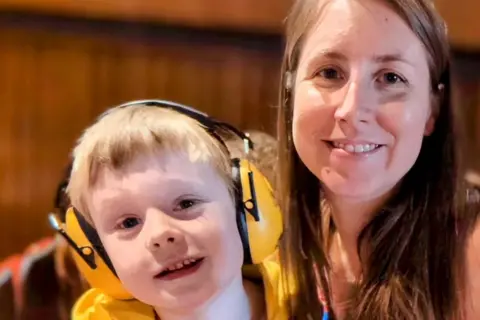[ad_1]
By Laurence Cawley, BBC News, Essex
 Family
FamilyThe county of Essex currently has the worst record in England for assessing children educational health care plans (EHCP) within 20 weeks. What do parents of children with special educational needs want their would-be MPs to know?
“I’m feeling really frustrated at the moment because none of the parties seem to be talking about special educational needs (SEN),” says Alexandra, who lives in mid Essex and has a six-year-old son with autism.
Her family waited seven months for George, who also needs speech and language support, to get an education, health and care plan (EHCP).
Despite the plan now being in place, however, Alexandra says she and her son have continued to face difficulties.
Although his EHCP includes speech and language therapy, she says, it has not yet been provided leaving the family to pick up the near £70 cost themselves.
“The way things are going, how is he going to get the help he needs and deserves?” she asks.
She wants whoever is in government to do more to support special educational needs provision for those who need it and to hold providers to account if and when they fail to deliver.
 Family
FamilyShe says while she is also concerned about the state of the roads, the difficulties she has experienced in getting a GP appointment or NHS dentistry, she finds herself viewing the world through the prism of special educational needs.
“When you have a child with SEN, it really is right at the centre of your life, even when you also have other non-SEN children.”
Last month, a meeting at Essex County Council heard the authority had 2,237 EHCPs awaiting assessment with 26 families having waited more than a year.
Essex County Council says it is putting a further £2.9m towards reducing “long wait times” for EHCPs. The money will be used to recruit more staff, increasing support levels, support families and other measures.
Helen Lincoln, executive director for children, families and education at the council, said the authority recognised the impact waits had on families and said improving its Send systems was a priority, adding: “We recognise there are different areas that need to be addressed across the system.”

Trained teacher Hannah has three sons, two of whom have special educational needs.
“The laws surrounding SEN provision are there, it doesn’t need to be changed – it needs to be delivered,” she says. “What we are finding is that there is a complete and utter disregard for statutory guidelines.
“We are looking for MPs to hold local authorities to their legal duties.”
Hannah, who lives in west Essex, says she has had to stop working as a teacher because her eldest son has no been able to access school.
Other commitments she would like to see from politicians include increased mental health support across the board, but particularly for parents of SEN children, improved access to activities for SEN children and improved support for carers.
She says families of SEN children have been especially badly hit by the rising cost of living.
Two of her children have to eat special diets which has meant a “tripling” of the family’s weekly shopping bills in recent years.
“People often don’t realise just how reliant we are on things being right and running smoothly,” says Hannah. “We don’t feel the system at present is working for us.”
Both Alexandra and Hannah say their experiences navigating the SEN system have made them highly engaged voters.
“We are looking for anything that will help us and politicians who are inclusive of us will be getting out vote,” says Hannah.
 Family
FamilyFellow mother Elizabeth lives in mid Essex and has a 14-year-old son, Harry, who is neurodivergent and currently being educated at home.
Like Hannah, Elizabeth has noticed a significant increase in the weekly shopping bill.
Five years ago, it was £80 a week. Now, she says, it is £150 a week.
Asked what she would want from a would-be MP, Elizabeth says it starts with “accountability”.
Like the other parents, Elizabeth wants local authorities better held to account in delivering the SEN provision they are legally required to.
Referring to Essex County Council’s current 1% rate of processing EHCPs within the statutory 20 weeks, she asks: “If other people were not doing 99% of their job on time, they would be out the door wouldn’t they?”
She says she wants more SEN schools built, a financial package equivalent to school place funding for children educated at home, better access to NHS dentistry and visits to schools by dentists to check on children’s oral health.

Rebecca, whose four-year-old son Tommy has special educational needs and is non-verbal, also wants greater accountability, including fines and compensation, if authorities fail to meet their legal obligations.
Like others, Rebecca, who lives in the Chelmsford area, says her family has been badly affected by the rising cost of living.
“Everything is more expensive,” she says. “With things like toys we have to buy sensory equipment, it is not just a case of popping into the toy shop.
“He prefers crunchy foods which often means making two separate family meals and he still uses nappies which means we’re spending £20 a week on them as well.”
She says she is often “drowning in paperwork” and would urge politicians to find ways of streamlining the system to minimise the form-filling in impact on parents.
Rebecca was far from alone in saying she wishes she had time to worry about other issues in the wider world beyond Tommy and getting the best provision for him.
“But I don’t,” she says. “I am mentally drained and if I had the choice between sleep and a night out, I’d always take the sleep.
“Of course I see things that our MPs could be helping with – but Tommy is my priority and I don’t have the mental space to think about anything other than making sure my son is properly catered for.”

What do the parties say?
The Conservatives promise to “transform education for children with special educational needs” by “ending the postcode lottery of support by delivering 60,000 more school places and a further 15 new free schools for children with special educational needs”.
The Green Party says SEN provision “within our mainstream school is simply unacceptable” and pledges “a £5bn fund to be invested in Send provision within mainstream schools” to ensure all schools were “fully accessible buildings, all schools would have specially trained teachers, and all local councils will have the funds to properly support Send students at school and in getting to school”.
Labour pledges to “take a community-wide approach, improving inclusivity and expertise in mainstream schools, as well as ensuring special schools cater to those with the most complex needs. It said it would “make sure admissions decisions account for the needs of communities and require all schools to co-operate with their local authority on school admissions, Send inclusion, and place planning”.
The Liberal Democrats say they will “tackle the crisis in special educational needs provision, and help to end the postcode lottery in provision, by giving local authorities extra funding to reduce the amount that schools pay towards the cost of a child’s ECHP and set up a a new National Body for Send to fund support for children with very high needs.
Reform UK has yet to respond to a BBC request for details of its plans for SEN provision.
[ad_2]
Source link freeslots dinogame telegram营销




